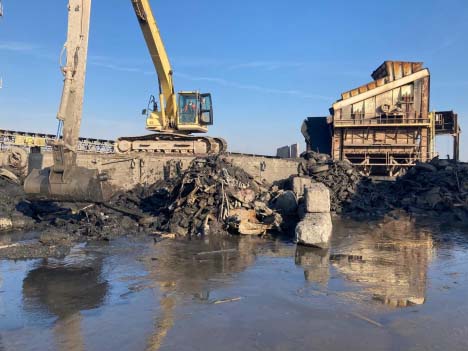INTRODUCTION
Dredged material is processed according to the Level 1 Archaeological Monitoring protocol outlined in the draft Cultural Resource Monitoring Plan (revised September 2020). This protocol calls for dredged soft sediments to be placed directly into barges, floated to the processing facility, and screened over bars on a vibrating platform. Items removed during the vibratory screening process are then sorted by trained personnel as per the draft Cultural Resource Monitoring Plan. Items of potential interest (possible artifacts or objects of local interests) are placed in a separate stockpile and photographed for archaeologists to review. These items are then placed in a holding area for archaeologists to inspect. To date, the vast majority of the recovered items consisted of modern debris and timbers.
RESULTS
On 12/10/20 an archaeologist reviewed photographs of items recovered from sediment screening. An archaeologist conducted a scheduled site visit on 12/11/20 to review the recovered items in person with the assistance of a dredge material processing facility machine and operator to sort through stockpiled items. Photographs were taken of stockpiled items.
Photographs of the latest material were reviewed prior to the site visit. The recovered items were spread by machine on a flat hard surface to allow for an archaeologist to clearly review them (Photographs 1 and 2). Any item of potential interest was separated, rinsed and assessed. The reviewed material consisted of modern debris, concrete and timbers including bulkhead timbers and possible pieces of piers. No objects of local interest or potential artifacts were recovered, as defined in the draft Cultural Resource Monitoring Plan.


ITEMS SEPARATED FOR FURTHER REVIEW
The archaeologist did not identify any objects of local interest or potential artifacts. No items were recommended for retention.
CONCLUSIONS AND RECOMMENDATIONS
The archeologist concludes that no items observed during the sediment screening retain possible historic/archaeological significance. Therefore, the archaeologist does not recommend that any items be retained. Per the draft Cultural Resource Monitoring Plan, the archeologist further recommends that all the non-historically/archaeologically significant debris reviewed as of 12/11/2020 may be disposed of.

Blue shading represents the approximate dredge areas.
